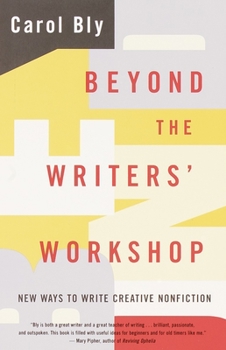Beyond the Writers' Workshop: New Ways to Write Creative Nonfiction
Select Format
Select Condition 
Book Overview
An innovative new approach to teaching and writing creative nonfiction from veteran teacher and critically acclaimed author Carol Bly. Teachers and writers everywhere are facing the limits imposed by the prevailing models of teaching: community or MFA "workshops" or, at the high-school level, "peer review." In Beyond the Writers' Workshop Carol Bly presents an alternative. She believes that workshopping's tendency to engage in wry scorn and pay exaggerated attention to technical details, causes apprentice writers, consciously or unconsciously, to modify their most passionate work. Inspired by a philosophy of individuality and moral rigor, Bly combines ideas and techniques from social work, psychotherapy, and neuroscience with the traditional teaching of fresh metaphor, salient dialogue, lively pace, and analysis of other literary work in her pioneering new approach. She also includes exercises and examples in an extensive practical appendix.
Format:Paperback
Language:English
ISBN:0385499191
ISBN13:9780385499194
Release Date:April 2001
Publisher:Knopf Doubleday Publishing Group
Length:400 Pages
Weight:0.77 lbs.
Dimensions:0.9" x 5.2" x 8.1"
Customer Reviews
5 ratings
Don't Judge This Book By Its Cover!
Published by Thriftbooks.com User , 19 years ago
I kind of fell over this book in Barnes and Noble one day and bought it despite its antiseptic and uninspiring title! I loved it. Reading it, I felt I was in the company of this insightful, challenging teacher, and, as a writer and a person, I felt greatly nourished by this book. She does what so few classes can: she transmits values. I'm so grateful I found it.
Another word from me...
Published by Thriftbooks.com User , 22 years ago
My feeling after reading this book was that if I'd had a teacher like Carol Bly it would have changed my life. Not just my writing--that, too--but my life. It's worth reading this book to be in the company of a stringent thinker and ethicist.
More than creative nonfiction
Published by Thriftbooks.com User , 22 years ago
This is a terrific book. Don't be fooled by the title. The book has useful and interesting things to say to anyone who writes or teaches writing or wants to do those things.
Effective Reference Tool
Published by Thriftbooks.com User , 23 years ago
This book is a great reference guide for those of us considering an MFA, writing degree, or career. I would not recommend this book be read from front to back, rather, utilize it as a refernce manual and/or topical approach. Bly gives the reader some thought provoking material. I enjoyed her dialogue on writing classes geared for the rich and poor. I've encountered situations where my writing was personally stilted due to commentary by the instructor. She answered some of these concerns which would be important for an instructor as well as student to understand. Mostly, I was inspired to write after reading it and have a better understanding of what I need to out of my writing. One of the better "workshopping" type books of its genre.
Fascinating, frustrating, necessary
Published by Thriftbooks.com User , 23 years ago
It is frustrating for such a necessary, provocative, and compelling book to also be badly organized and often clumsily written. Carol Bly has some truly powerful ideas about how to write and teach writing, as well as why. Indeed, she is the most forceful voice for morality in writing since John Gardner, and many of her ideas should be taken seriously, debated in the pages of literary journals, the classrooms of universities and writing workshops, the hallways of teachers' conventions. But the reader can also regret that Bly did not take the time to organize her thoughts into a more coherent form, or to express them with more care and elegance. It is sad that such a valuable book about writing is itself so often badly written.Few books for writers, though, are as full of useful advice and provocative philosophy. Despite the subtitle, this book isn't simply for writers of creative nonfiction -- it is for anyone who wants to put words on paper in any genre whatsoever, because the questions Bly probes are universal ones. Few of her chapters address creative nonfiction specifically in a way that excludes other genres, and the exercises she provides at the end of the book are useful for any sort of writer, at any skill level.Perhaps the most valuable audience for this book is teachers of writing, whether they are elementary school teachers or instructors in MFA programs. There are specific chapters for all levels of teachers, but the most useful discussions take place outside those chapters -- discussions of the ethics of writing and teaching writing, as well as the processes.Bly links writing to ideas from neuropsychologists, social workers, philosophers, and moral psychologists such as Lawrence Kohlberg to broaden the context of writing beyond that of the American "junk culture". While at times this viewpoint leads her toward self-contradiction or a reductive orneriness, on the whole she makes a convincing argument for passionate, committed writing which doesn't slink away from questions of morality and metaphysics.






